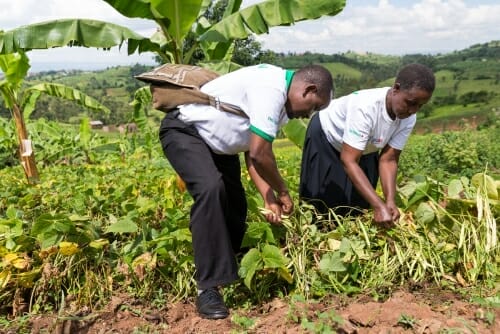News > Blog
Promoting Best Practices in Cooperative Development in Uganda
Published 01/12/2018 by Global Communities

Promoting Best Practices in Cooperative Development
Despite rapid growth over the past decade and a decrease in poverty, approximately 27 percent of the Ugandan population continues to live below the poverty line. Much of the poverty is concentrated in rural areas of Uganda. With agriculture constituting 80 percent of the workforce, there is a need to assist smallholder farmers to increase their crop yields, improve food security and increase incomes. Rural smallholder farmers commonly lack access to markets, improved inputs, technical knowledge of planting and harvesting processes as well as have limited to no access to post-harvest storage facilities. Combined, these challenges limit farmers’ agricultural productivity. The cooperative development model is a strong tool for bringing these diverse smallholder farmers together to overcome common challenges to achieve key objectives.
The Developing Economic Strengthening Interventions for Group Production (DESIGN) aimed to help smallholder farmers in Bushenyi District to achieve their full economic potential. DESIGN distinguishes itself from the standard cooperative development programs as it was primarily focused on research.
Read the research here.
The DESIGN program worked in partnership with Professor “Bert” J. Morrow, an expert in cooperative development, and his students from Birmingham Southern College (BSC), to conduct survey research to better understand what motivates smallholder farmers in Bushenyi District to join cooperatives and to assess how trust is formed between cooperative members and between members and management. With this information the DESIGN program worked to devise methods to overcome many of the challenges attributed with cooperative failures from the past, including distrust of cooperative management, lack of cohesion among group members and unclear cooperative goals and objectives from the beginning that ultimately lead to the dissolution of a cooperative.
In addition to its research objectives, the DESIGN program put its principles into practice through the formation of an agricultural cooperative in Bushenyi, Uganda, the Kyeizooba Twimukye Cooperative Society that is focused on the beans value chain. DESIGN provided a diverse array of technical assistance to the cooperative including agricultural training in the beans value chain, nutrition programming, Ebola awareness and prevention training and comprehensive training on cooperative fundamentals such as good financial and governance practices. Furthermore, the DESIGN program used the findings and best practices from its research efforts and applied these learnings to the Kyeizooba Twimukye Cooperative Society to make it a model cooperative.
These activities are part of a larger Global Cooperative Learning Program that builds on the experiences of cooperative members, private sector stakeholders and program implementers focusing on how cooperatives can impact members, their communities and markets around the world. Read more about Global Communities’ work promoting the development of cooperatives.





